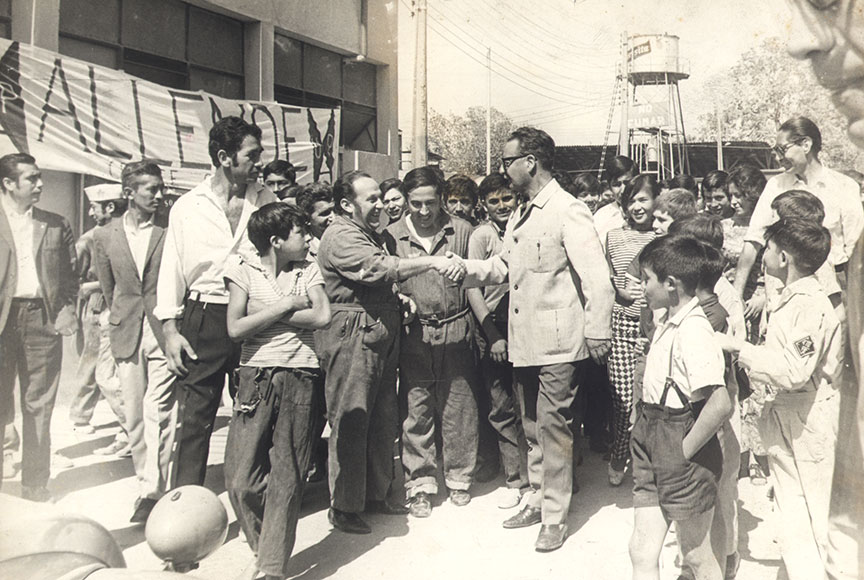1973 Allende Killed in Coup

A military coup, purportedly supported by the American CIA, deposed President Allende of Chile and replaced him with Augusto Pinochet Ugarte. Pinochet was committed to the elimination of Communisim in Chile. Towards this end, he was responsible for the arrest of thousands.
On September 11, 1973, a military coup in Chile overthrew the democratically elected government of President Salvador Allende, marking one of the most infamous and controversial events in modern Latin American history. The coup, purportedly supported by the American CIA, brought General Augusto Pinochet Ugarte to power, a man who would go on to lead Chile with an iron fist for nearly two decades. Pinochet's regime was characterized by its staunch anti-communism, brutal repression, and sweeping economic reforms that left a lasting impact on the country.
Salvador Allende, a Marxist and the first socialist to be elected president in Chile, had won the presidency in 1970 with a vision to transform Chile into a socialist state through peaceful and democratic means. His government pursued policies of nationalization, land redistribution, and social welfare programs aimed at reducing inequality and elevating the standard of living for Chile's poor. However, these policies quickly put Allende at odds with the Chilean elite, the military, and the United States government, which viewed his socialist agenda as a threat to American interests in the region, particularly during the Cold War.
The United States, under President Richard Nixon and his National Security Advisor Henry Kissinger, was deeply concerned about the spread of communism in Latin America. The Nixon administration feared that Allende's Chile could become another Cuba, providing the Soviet Union with a foothold in the Americas. As a result, the CIA was authorized to undermine Allende's government through covert operations, economic destabilization, and support for opposition groups. While the full extent of CIA involvement in the coup remains a subject of debate, declassified documents have revealed that the U.S. provided financial and logistical support to anti-Allende forces in Chile, setting the stage for the eventual military takeover.
On the morning of September 11, 1973, the Chilean military, led by General Augusto Pinochet, launched a coordinated attack against the presidential palace, La Moneda, where Allende and his loyalists had taken refuge. Despite Allende's efforts to rally his supporters, it quickly became clear that the military had overwhelming power. Rather than surrender, Allende chose to commit suicide, reportedly using a rifle gifted to him by Fidel Castro. His death marked the end of Chile's brief experiment with democratic socialism and the beginning of a brutal military dictatorship.
Pinochet, who emerged as the leader of the military junta, was fiercely committed to eradicating communism in Chile. He believed that the survival of the nation depended on the complete elimination of leftist ideologies and those who supported them. In the aftermath of the coup, Pinochet's regime launched a campaign of terror against anyone suspected of being a communist or an Allende sympathizer. Thousands were arrested, tortured, and executed during the infamous "Caravan of Death," a series of military operations aimed at eliminating political opponents.
Under Pinochet's rule, Chile became a police state. The military, police, and intelligence services were given sweeping powers to suppress dissent. The notorious secret police, known as the DINA (Dirección de Inteligencia Nacional), played a key role in hunting down and eliminating perceived enemies of the state. Human rights organizations estimate that more than 3,000 people were killed or disappeared during Pinochet's regime, while tens of thousands more were subjected to torture, imprisonment, or exile.
Pinochet's economic policies, while highly controversial, also had a profound impact on Chile. With the guidance of a group of economists known as the "Chicago Boys," who were influenced by neoliberal theories, Pinochet implemented radical free-market reforms. These included privatization of state-owned enterprises, deregulation, and the opening of Chile's economy to global trade. While these policies led to significant economic growth and reduced inflation, they also resulted in increased inequality and the concentration of wealth in the hands of a few.
Pinochet remained in power until 1990, when international and domestic pressure forced him to step down after losing a plebiscite on his rule. Although he left the presidency, Pinochet retained significant influence in Chilean politics as commander-in-chief of the army and later as a senator-for-life. His legacy remains deeply divisive in Chile, where he is remembered both as a brutal dictator and as the architect of Chile's modern economy.
The coup against Allende and the subsequent dictatorship of Pinochet left an indelible mark on Chilean society, politics, and economics. It serves as a stark reminder of the dangers of authoritarianism and the human cost of ideological conflict during the Cold War.
 >
>